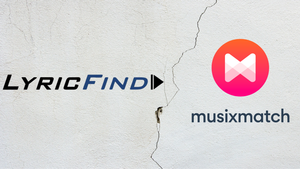LyricFind insists that arguments put forward by its rival Musixmatch in an antitrust legal battle have no substance. In a new court filing, the lyrics aggregator remains forthright in accusing its rival of anticompetitive conduct, while founder Darryl Ballantyne says that Musixmatch, in its attempts to get LyricFind's antitrust lawsuit dismissed, is “grasping at straws to keep this case from going to trial”.
The new filing also reveals that the owner of Musixmatch, private equity group TPG Global, tried to buy LyricFind in 2023 “to remove it from the market”, and then allegedly used confidential information secured during the acquisition talks to try to scupper a deal between LyricFind and Spotify. Those allegations were redacted from the original lawsuit when it was filed in March.
When those efforts to combat the competition posed by LyricFind failed, it’s claimed, Musixmatch entered into the exclusivity deal with Warner Chappell that is at the heart of the antitrust litigation.
Both Musixmatch and TPG submitted various arguments for why LyricFind’s lawsuit should be dismissed last month. But, says Ballantyne, those arguments “misrepresent the reality of lyric licensing” and anyone who understands the music industry “will see through” them.
Adamant that Musixmatch’s motion for dismissal will be rejected by the judge, the LyricFind founder adds, “we look forward to starting discovery to see the full depth of their alleged anticompetitive scheme”.
Both Musixmatch and LyricFind aggregate and license lyrics across the music industry. They then provide their clients - including streaming services and other digital platforms - with those lyrics under their licences from the relevant rightsholders, including songwriters and music publishers.
Traditionally aggregators have all secured licences from the same publishers, and then competed for clients based on what specific services they offer and pricepoint. However, that changed when Musixmatch entered into an exclusivity deal with Warner Chappell, meaning LyricFind can no longer include the major publisher’s lyrics in its deals with streaming services.
LyricFind argues that Musixmatch pressured the Warner publisher into the exclusivity arrangement simply to freeze its rival out of the market, mainly because it feared losing one of its biggest clients, Spotify, to its competitor.
In the new court filing, LyricFind writes that - in 2023 - “TPG tried to acquire LyricFind to remove it from the market”. As part of that process TPG had access to some confidential information about LyricFind which was subject to a non-disclosure agreement.
And, “when TPG’s acquisition bid failed, Musixmatch and TPG leaked NDA-protected information about LyricFind to Spotify to try to prevent Spotify from signing with LyricFind, violating the NDA”.
“Musixmatch’s fear of losing Spotify was acute”, it adds, because “LyricFind had nearly finalised a deal with Spotify to become its lyrics provider at rates substantially below Musixmatch’s”. Instead of “lowering its prices or making a better offer to Spotify”, the lawsuit goes on, “Musixmatch and TPG opted to foreclose competition”.
Having failed to remove LyricFind from the marketplace through acquisition, Musixmatch secured the Warner exclusivity deal to “cut off LyricFind’s ability to supply the lyrics that streaming services demand”.
In its motion to dismiss LyricFind’s lawsuit, Musixmatch raised both jurisdiction issues and other arguments for why its rival’s antitrust claims were invalid.
On the jurisdiction point, Musixmatch said that LyricFind was wrong to pursue its legal action through the Californian courts, because LyricFind is Canadian, Musixmatch is Italian and the Warner Chappell exclusivity deal was agreed with the UK division of the Warner publisher.
But the courts in California should hear the dispute, LyricFind counters, because Musixmatch “purposefully directed its anticompetitive conduct at the US and California”. Plus the US is “the epicenter of the lyric-services industry” and home to Warner Chappell’s licensing business, “much of Musixmatch’s leadership” and nearly all the major streaming services impacted by Musixmatch’s Warner deal.
LyricFind then insists that its claims that Musixmatch breached US antitrust laws are strong, stating, “LyricFind has suffered quintessential antitrust injury”, and that the company’s “lost profits and depressed value flow directly from Musixmatch’s efforts to foreclose competition and reduce market choices - precisely the type of harms that the antitrust laws were designed to prevent”.
A spokesperson for Musixmatch provided the following statement on the LyricFind litigation: “LyricFind filed a nuisance lawsuit against Musixmatch, complaining about the same type of licensing practices that it has used in the recent past. LyricFind is now accusing Musixmatch of foul play and hiding behind the copyright laws, when in reality it is precisely those laws that ensure rights owners have a choice about who they do business with and that songwriters are compensated for their creative works. LyricFind’s misguided attempt to recover in court what it couldn’t win in the market place would infringe upon and limit the choices that music rightsholders make”.

